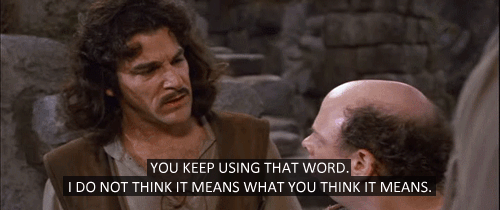I don’t think I’m going to say what you think I’m going to say.
I’ll admit up front that I liked Joseph Bottum’s recent essay in Commonweal, “The Things We Share.” It was long, but it was deliciously long, a four-course meal instead of a thick steak on a plate. It was meandering, but I admired the craftsmanship behind the apparent aimlessness. It didn’t get to the point right away, which I understood to be kind of the point. What I didn’t like was the subtitle, “A Catholic’s Case for Same-Sex Marriage.” As others have rightly pointed out, this essay didn’t make a case for anything. What it did was create a climate, an environment, an emotional, intellectual, and spiritual state of being.
Having been forewarned about the length, I prepared to slog through 60,000 words of dreadful logic about same-sex marriage and Catholic teaching as a kind of Dickensian castor oil. You have to read this, self, because if you don’t get a handle on your own doubts, fears and concerns about gay marriage, this essay could be your ghost of Blogging Future.
By the end of it, though, I knew that this was my ghost of Blogging Present. I recognized myself at every turn. (Except, obviously, the part where he starts talking about Foucault and political philosophy.) I recognized the pain of friendship lost, the frustration at the apparent flimsiness of the “natural law” over which these rifts are growing, the wariness of anti-Catholicism, the disenchantment with the world at large and with marriage and sex in particular, the knowledge of my own cowardice, the weariness of fighting a battle that was lost ages ago, and the deep desire for peace among us. The longing that we might find a way to live as brothers and sisters.
In a way, reading his essay felt a bit like reading Annie Dillard. None of the individual pieces meant anything on their own. There was not (in spite of Bottum’s own insistence that he was getting there, or even that he got there) a coherent argument made for gay marriage. But everything worked together to form an image of the political, spiritual, emotional, and intellectual ether in which we are struggling with gay marriage.
I happened to agree with much of what he said, most particularly this bit:
But same-sex marriage is already here; it’s not as though we can halt it. And other profound statements of conservatism remind us that we must take people as we find them—must instruct the nation where the nation is.
It reminded me of something Hallie Lord wrote once. It also reminded me that this entrenched legal battle to stop civil gay marriage is doing nothing but sowing bitterness on both sides. Whoever wins or loses, the existence of gay people, gay partnerships, and gay family units isn’t just going to disappear…and to tell you the truth, I think it would be pretty awful of us to hope it will. At some point, we’ll either have to learn to get along with each other, however inconvenient our beliefs in morality are to them, however inconvenient their beliefs in morality are to us.
One of the great problems with this is that not all Christians believe that this is where the nation is. It’s still an abstraction for too many of us, something to be debated on the internet and after church and over dinner with friends. Gay marriage isn’t real, not really, unless you have the misfortune to live in New York City or godforsaken California. Certainly it’s not in our neighborhood, on our streets, or in our churches.
There’s the same thing from the other side, too: a profound condescension for hillbillies who cling to their guns and religion, who react with bigotry because they’re too stupid to realize that the world is bigger than their Sunday potluck.
I think it’s a little different for my generation, and certainly very different for the generation after me. We do have gay friends, and our gay friends have kids, and those kids play with our kids. It’s not an abstract idea that legalization will allow to become a concrete reality; it’s a concrete reality that legalization will just nod at, basically, to make things equal in the courtroom.
That reality makes battling against it harder…maybe in part because we’re cowards, yeah. But also in part because we love our gay friends, and “hate the sin, love the sinner” is a platitude stitched on a pillow, not something that is even remotely that easy in real life. Especially because, when it comes to gay marriage, rejecting the sin is usually interpreted to mean rejecting two people and the entire life they’ve built. There is a real, human, divinely-inspired desire to show love to our fellow man, and rejecting gay marriage doesn’t feel a lot like love.
Especially when all we have to go on is “natural law.” Here’s what I think every time I hear most people use the term “natural law”:
Mostly when people today toss out a reference to “natural law”, they really mean “biology.” To be crass, they mean “those parts don’t fit together.” If they’re Catholic or Mormon, they might toss in “and they can’t make a baby“. Let me tell you who is convinced by this argument: exactly no one, including, usually, the person making it.
Appeals to “biology” don’t stop us from shoving our feet into unnatural heels, sucking down cigarettes, and even using tampons. They don’t stop us from pulling a baby out of a slice in a woman’s abdomen, no matter how much the baby isn’t supposed to come out that way. They didn’t stop us from binding little girls’ feet. They didn’t stop tons of men in the ancient world and in the modern one from having at least a few wives. (Those parts also wouldn’t fit, by the way, because of simple arithmetic.) In short, we humans have a long and storied history of short-circuiting the way our bodies are “supposed” to work to achieve something else. A higher good, if you will. Nowhere is this more apparent than in our extensive embrace of the Pill, meant to stop our bodies from working like they’re supposed to and prevent all those babies. So let’s be honest…there’s no way gay people are going to be able to keep a straight face as we explain that they can’t get married because their parts can’t make babies while we toss back our Yaz. I can’t even keep a straight face at that argument. It’s absurd. Furthermore, that’s not really what “natural law” means. Anymore than “literature” means “stories people made up and wrote down”.
As Joseph Bottum points out, Thomas Aquinas, building on Aristotle, assembled “a grand, beautiful, and extremely delicate structure of rationality.” There is a natural law that informs everything. However, “natural law” involves the use of reason. Aquinas divides reason into the “speculative” and the “practical”. We’re talking about practical issues here, right? Sex, marriage, human relationships? Practical reason, as Aquinas points out, moves “from the common to the proper”. Basically, our practical reason in informed by looking around us:
Hence this is the first precept of law, that good is to be done and pursued, and evil is to be avoided. All other precepts of the natural law are based upon this: so that whatever the practical reason naturally apprehends as man’s good (or evil) belongs to the precepts of the natural law as something to be done or avoided. (Summa Theo., I-II: Q.94, A.2)
Our society is obviously not properly ordered. It’s so far from being properly ordered, in fact, that I doubt Aquinas or Aristotle would even believe such a society could exist. Nearly half of us were raised in broken homes. More than half of us, if we get married, will get divorced. A single parent home is as common as a dual-parent home. Sex is everywhere, on magazine covers at the grocery store, on the internet, on TV. Nothing is sacred. Furthermore, nature, insofar as it exists in modern city and suburban life, is manicured and transplanted and sprayed with pesticides. Most of us don’t even know what the created Earth looks like. How can we honestly expect anyone, even Christians raised in Christian homes, to really understand natural law and the way it is ordered toward the good when the only “common” that we’ve ever known is such a warped and manipulated image of creation? I’d argue that our understanding of natural law is primarily through the use of speculative reason now. Nature has become unrecognizable, and so it has been relegated to the realm of theory.
All this is not to say that I think we should all immediately go gay and get married. All this is not to say that I actively support the legalization of gay civil marriage. All this is not to say that I reject the teachings of the Church in any way. There is truth in the Church, and wisdom beyond measure. She has been entrusted to safeguard the teachings of God himself. Even the teachings I don’t understand (of which there are plenty), I still submit to. That’s what it means to be a Catholic.
I just also happen to agree with Joseph Bottum, that the fight over gay civil marriage is not the good fight we should be fighting. If it ever comes down to the state pressing the Church to perform such marriages as sacraments, that will be the good fight, the fight we must have, the fight we must not back down from. As it is, the Church doesn’t even recognize civil marriage as valid anyway*. A civilly married Catholic couple has to have their marriage convalidated. I know, because that’s what we did. Attempting to stop legalized gay civil marriage because of the “grave threat” it poses seems disingenuous, not just to gay people but to everyone. Even to me. Where was the united effort to stop legalized no-fault divorce? Or contraception? We didn’t fight those civil battles. Why are we fighting this one?
A good fight to fight is the one where our goal is to bring Christ into the world by emulating him. Bottum called it “the re-enchantment of reality”. That’s one way to put it, I guess. Maybe the better place to start, though, is the place where we got it all wrong to begin with. Maybe we ought to figure out the right way to love our spouses and our children and do that first. If the ripple effect began in the breakdown of the family, building it back up again can’t fail to produce another one.
*An important clarification that my friend Leila brought to my attention: “Actually, the Church does recognize the civil marriages of Protestants, Buddhists, etc. For non-Christians, those marriages are considered natural and valid. For two baptized Protestants, those civil marriages are considered sacramental (even if the Protestants themselves don’t realize they have a sacramental marriage). Anyone who is free to marry is considered by the Church to have a valid marriage even if the marriage was performed in Vegas, or in front of a JP. It is only Catholics who are required (as one of the precepts of the Church) to be married in the Church (witnessed by a priest or deacon) or else get a dispensation from the bishop.” My apologies for misstating the Church’s position on civil marriage.











